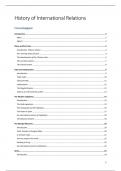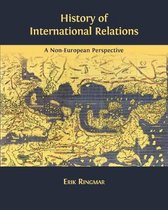History of International Relations
Inhoudsopgave
Introduction.................................................................................................................................................... 3
Why?................................................................................................................................................................... 3
What? ................................................................................................................................................................. 3
China and East Asia ......................................................................................................................................... 4
Introduction: What is China? .............................................................................................................................. 4
The ‘warring states period’ ................................................................................................................................. 4
The development of the Chinese state ............................................................................................................... 5
The overland system ........................................................................................................................................... 7
The tribute system .............................................................................................................................................. 8
India and Indianization ................................................................................................................................... 9
Introduction ........................................................................................................................................................ 9
Vedic India ........................................................................................................................................................ 10
Classical India ................................................................................................................................................... 11
Indianization ..................................................................................................................................................... 12
The Mughal Empire .......................................................................................................................................... 13
India as an international system ...................................................................................................................... 13
The Muslim Caliphates .................................................................................................................................. 14
Introduction ...................................................................................................................................................... 14
The Arab expansion .......................................................................................................................................... 14
The Umayyads and the Abbasids...................................................................................................................... 16
The Arabs in Spain ............................................................................................................................................ 17
An international system of caliphates .............................................................................................................. 18
The Ottoman Empire ........................................................................................................................................ 19
The Mongol Khanates ................................................................................................................................... 20
Introduction ...................................................................................................................................................... 20
From Temüjin to Genghis Khan ........................................................................................................................ 20
A nomadic state ................................................................................................................................................ 21
How to conquer the world ................................................................................................................................ 22
Dividing it all up ................................................................................................................................................ 23
An international system of khanates ................................................................................................................ 24
Africa ............................................................................................................................................................ 24
Introduction ...................................................................................................................................................... 24
1
, The Nile River Valley ......................................................................................................................................... 25
(North Africa) .................................................................................................................................................... 25
The kingdoms of West Africa ............................................................................................................................ 25
East Africa and the Indian Ocean ..................................................................................................................... 27
An African international system? ..................................................................................................................... 27
European Expansion ..................................................................................................................................... 28
Introduction ...................................................................................................................................................... 28
A sea route to India .......................................................................................................................................... 29
Europeans in the “New World”......................................................................................................................... 30
A commercial world economy .......................................................................................................................... 32
An industrial world economy ............................................................................................................................ 33
The apotheosis of colonialism .......................................................................................................................... 34
Belgian Colonialism....................................................................................................................................... 35
Introduction ...................................................................................................................................................... 35
The Congo Free State (1884-1906) ................................................................................................................... 36
Belgian Congo (1908-1960) .............................................................................................................................. 39
Ruanda-Urundi (1916-1962) ............................................................................................................................. 41
Conclusion ........................................................................................................................................................ 41
Global Governance in the 19th century .......................................................................................................... 42
Prehistory (17th – 18th century) ......................................................................................................................... 42
19th century....................................................................................................................................................... 43
The League of Nations and its failure ............................................................................................................ 46
Observations of WWI........................................................................................................................................ 46
The League of Nations: origins ......................................................................................................................... 47
The League of Nations: organizational form .................................................................................................... 48
The ‘failure’....................................................................................................................................................... 49
The United Nations and decolonization ........................................................................................................ 50
Introduction: WWII ........................................................................................................................................... 50
The establishment of the United Nations ......................................................................................................... 52
Human Rights in the UN Charter ...................................................................................................................... 54
Decolonization and the Bandung Conference................................................................................................... 55
2
,Introduction
Why?
Useful for social scientists to study history?
• Understand the present: causal connection the past - the present (influence)
1) Historical legacies = stickiness of the past
Ex. Post-communist societies: little political trust (< communist rule)
2) Politics of historical memories = narrative motivates behaviour
Ex. RUS & OEKR past annexation à now invasion
Political/collective memories
- Pushing, Effort: Are cultivated, propagated by ‘memory activists’
- Selection & exclusion
- Takes infrastructure, political pedagogy
Ex. build museum, rewrite history books
- High degree homogeneity
- Relies on symbols & rites à enhances emotions of empathy &
identification
• To cultivate political wisdom/prudence, to learn out of past mistakes
o Trying to see patterns ‘history repeats itself’
• The contingency of moral ideas & social arrangements
Ex. no slavery, gender equality, etc.
o Why has things developed this way?
o It’s not obvious, was not always like this
What?
Expect to learn in this class? People, events, concepts, processes
• Emphasis bad events/people/… : skewed representation
• Presentist: Recent history
o Expand timeframe
• Eurocentric bias: Western international history
o Is changing, globalizing
o Expand geographical horizon
Is it a problem that it is presentist & Eurocentric?
• Patterns
Ex. Balance of power theory (= 1 powerful country, others also or group together to
even out the power): evidence only from EU history
• Useful to study: Non-western powers are re-asserting themselves for their power
(hist legacies & memories)
• Hasty conclusions
o Narrow, little empirical evidence
The International system
• Basic unit: state, sovereign state
à identification: Strict borders, flags, anthems
à belonging to = passports, no freedom of travel/living
à Rules & norms: sovereign equality, non-interference
• Implications: anarchy, security dilemma, violence
• Good to remember: International politics has functioned differently in the past
3
, China and East Asia
Introduction: What is China?
2 questions
1. What is China?
o A ‘country’; definition
- a common authority
- groups of people identify w/ it (a nationality)
- clear borders
- a state
o Need to be historically explained
o WHAT NOT: a nation-state
- The government wants a nation-state (nationalism ideology)
- History: ( A succession of) Imperial dynasties of being the ‘middle
kingdom’ (zhongguo)
§ Not called China (now neither)
§ Ruled over by dynasties: not all culturally Chinese, they were
nomadic
- A civilizational zone: sharing set of ritual practices
Ex. seasonal celebrations, ancestor worship, human sacrifices,
alphabet, etc.
§ Travelling across territory = same zone
§ Recognizing each other
§ Ruled bcs mandate of heaven
2. What does it mean to identify a ‘Chinese’ international system?
o A systematic interaction w/ rules & norms between East-Asian policies
o China dominated the system à influenced so hard that it defined it
- For their own benefit
- Reflecting a Chinese tradition, culture: what is the substance
o Chinal centric system: not stable, under challenge regulary
o Confusion political tradition à political practices formed the org of diplomatic
interaction
o WHAT NOT: encompassing, unchanging, unquestionably Confucian system (=
Chinese philosophy, impact on chin politics, official philosophy)
- They were more philosophies (some w/ more influence)
- Overland system: policies to the N & W
- Tribute system: policies to the S & E (inspired
by Confucianism)
à different way of ruling, philosophies
The ‘warring states period’
= earliest episode in Chinese history (475 – 251 BCE)
!!BCE = same calendar as BC, Before the Commen Era
• Not a ruling dynasty, multiple equally
powerful&independent policies (middle kingdoms)
Ex. Zhao, Yan, etc.
4





